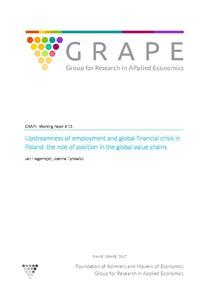Upstreamness of employment and global financial crisis in Poland: the role of position in the global value chains
"The emergence of global value chains leads to fragmentation of the production processes and reallocation of those processes across countries. With increasing number of production stages, the manufacturing process is located increasingly further away from the consumer. Literature suggests that...
| Main Authors: | , , |
|---|---|
| Institution: | ETUI-European Trade Union Institute |
| Format: | TEXT |
| Language: | English |
| Published: |
Warsaw
2017
FAME |
| Subjects: | |
| Online Access: | https://www.labourline.org/KENTIKA-19395480124911136629-upstreamness-of-employment-and.htm |
| _version_ | 1771659893964537856 |
|---|---|
| author | Foundation of Admirers and Mavens of Economics, Warsaw Hagemejer, Jan Tyrowicz, Joanna |
| author_facet | Foundation of Admirers and Mavens of Economics, Warsaw Hagemejer, Jan Tyrowicz, Joanna |
| collection | Library items |
| description | "The emergence of global value chains leads to fragmentation of the production processes and reallocation of those processes across countries. With increasing number of production stages, the manufacturing process is located increasingly further away from the consumer. Literature suggests that fragmentation of production increases the international transmission of shocks. The global financial crisis is believed to lead to consolidation and shortening of global value chains and amplification of demand shocks along the global value chains, the so-called bullwhip effect. In this paper we study the effects of global financial crisis on employment, focusing specifically on the role of the distance from final demand (upstreamness) in this adjustment. We find that upstreamness matters for both labor demand and adjustment in employment during the periods of crisis, but this relationship is heterogeneous across countries. While the reaction to the crisis is indeed amplified further away from final demand, contrary to our expectations it is mostly channeled through lower job creation rates rather than faster job destruction. Moreover, the adverse effects of the crisis are lower in foreign firms, this difference does not depend on the distance from final demand." |
| format | TEXT |
| geographic | international |
| id | 19395480124911136629_d77da34c1fd54a8db19fde48b6594e80 |
| institution | ETUI-European Trade Union Institute |
| is_hierarchy_id | 19395480124911136629_d77da34c1fd54a8db19fde48b6594e80 |
| is_hierarchy_title | Upstreamness of employment and global financial crisis in Poland: the role of position in the global value chains |
| language | English |
| physical | 1 v. Digital |
| publishDate | 2017 |
| publisher | Warsaw FAME |
| spellingShingle | Foundation of Admirers and Mavens of Economics, Warsaw Hagemejer, Jan Tyrowicz, Joanna value chains production management economic recession employment multinational enterprise Upstreamness of employment and global financial crisis in Poland: the role of position in the global value chains |
| thumbnail | https://www.labourline.org/Image_prev.jpg?Archive=131110295939 |
| title | Upstreamness of employment and global financial crisis in Poland: the role of position in the global value chains |
| topic | value chains production management economic recession employment multinational enterprise |
| url | https://www.labourline.org/KENTIKA-19395480124911136629-upstreamness-of-employment-and.htm |

